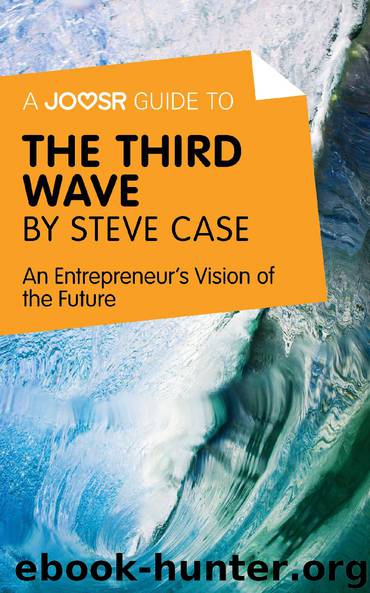The Third Wave by Steve Case

Author:Steve Case
Language: eng
Format: epub
Publisher: Joosr Ltd
Entrepreneurs need to encourage governments to relax immigration laws to encourage foreign talent
Although governments do fulfill important functions, that doesn’t mean everything they do is beneficial for start-ups. Strict immigration laws are particularly damaging as they prevent foreign-born innovators from sharing their talent, and entrepreneurs should attempt to influence governments to relax their approach.
Several of the most prominent, pioneering internet companies including Yahoo!, Google, and eBay have at least one migrant founding member. And it’s not just some famous exceptions: the Kaufman Foundation report that, of all the tech companies set up in Silicon Valley between 2006 and 2012, half had at least one founder who was not born in the United States. Similarly, according to the Centre for Entrepreneurs, one in every seven UK companies was founded by a migrant entrepreneur. However you cut it, it’s undeniable that immigration plays a vital role in entrepreneurism and innovation in the US and UK.
But with growing anti-immigration politics, the crucial role foreign-born innovators play in founding start-ups, developing technology, driving change, and creating jobs is being forgotten, and it’s becoming increasingly difficult for experts and innovators to obtain visas. In the United States, the number of available H-1B visas for specialty workers has been capped at 140,000 a year since 1990. Regulations like this restrict the flow of knowledge, experience, and innovation into the United States, and make it questionable that the country will maintain its reputation for pioneering in internet and technology industries. This is especially true when compared to the number of countries, from Chile to Canada to New Zealand, that have developed “start-up visas” to draw in foreign-born talent.
Faced with such growing competition, the United States in particular must endeavor to do more to welcome migrant entrepreneurs. And that means native entrepreneurs have a responsibility to engage politically to encourage these changes. Innovation is not a solo project: it’s driven by numerous teams all creating, and then building upon, new technologies and approaches, collectively driving things forward. And such team efforts are far more effective when no one is excluded from participating. Start-ups and established businesses can all help bring this about, but only if they all keep applying pressure to their governments to relax or remodel their immigration regulations.
Foreign-born talent is a key part of the driving force behind US and UK entrepreneurism, and is responsible for many of our most famous innovations. This must be both maintained and encouraged, and entrepreneurs can contribute to this by pressuring governments to take a more start-up-friendly approach to immigration.
Download
This site does not store any files on its server. We only index and link to content provided by other sites. Please contact the content providers to delete copyright contents if any and email us, we'll remove relevant links or contents immediately.
Hit Refresh by Satya Nadella(9133)
When Breath Becomes Air by Paul Kalanithi(8446)
The Girl Without a Voice by Casey Watson(7889)
A Court of Wings and Ruin by Sarah J. Maas(7845)
Do No Harm Stories of Life, Death and Brain Surgery by Henry Marsh(6941)
Shoe Dog by Phil Knight(5267)
The Rules Do Not Apply by Ariel Levy(4969)
A Higher Loyalty: Truth, Lies, and Leadership by James Comey(4963)
Hunger by Roxane Gay(4928)
Tuesdays with Morrie by Mitch Albom(4784)
Everything Happens for a Reason by Kate Bowler(4743)
The Immortal Life of Henrietta Lacks by Rebecca Skloot(4588)
Millionaire: The Philanderer, Gambler, and Duelist Who Invented Modern Finance by Janet Gleeson(4478)
How to Change Your Mind by Michael Pollan(4356)
All Creatures Great and Small by James Herriot(4322)
The Money Culture by Michael Lewis(4207)
Man and His Symbols by Carl Gustav Jung(4135)
Elon Musk by Ashlee Vance(4127)
Tokyo Vice: An American Reporter on the Police Beat in Japan by Jake Adelstein(3996)
